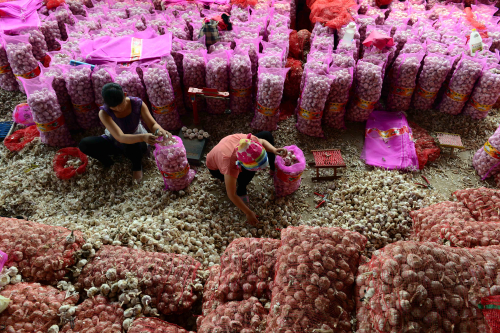 |
|
HEALTH INSURANCE: Workers pack garlic at a market in Jinxiang County, east China's Shandong Province (GUO XULEI) |
I sat down in a small, crowded hutong restaurant and waited for the harried waitress to finally navigate through the bustle of requests and take my food order. From my obvious appearance as a foreigner, she must have guessed in advance that my spoken Chinese would be barely intelligible.
As I waited, I mooted whether or not to blow my runny nose on a few sheets taken from the toilet paper roll deposited at my table, a white cluster of garlic bulbs resting against the small spool caught my attention. I surveyed my surroundings and again noticed that where each customer sat, accompanying the toilet paper that sufficed as napkins, were whole bulbs or half clusters of garlic. I watched one man quickly pry open a cluster, peel a raw clove and pop it into his mouth, crunching and swallowing while waiting for his food. Wow! This person demonstrated not even the slightest modicum of concern about having the offensive odor of garlic linger on his hands and breath after he left. No one that I knew in the West would in public proudly wear the aroma of garlic as one's personal signature scent. In accordance with our popular mythology, having the plant's aroma about one's person or on one's breath is acceptable only when attempting to fend off werewolves and vampires!
Having read The Republic of Wine by globally acclaimed writer Mo Yan, I was seduced into obtaining the rest of his works and found myself particularly enjoying The Garlic Ballads. In one chapter, the author gives the description, "Paradise County garlic is long and crunchy," and in another, his peasant characters sing the lines: Everyone is happy when garlic is sold / but their hearts boil over when it is not. Upon reading these passages my mind immediately drifted back to the first time I arrived in Beijing and an image that still sticks with me. It was of a lone bicycle parked outside a closed shop. Behind its seat was hung a huge bundle of 20 or 30 long braids of fat bulbs of garlic tied together with twine, causing the two-wheeled vehicle to lean precariously to one side as if on the verge of toppling over. Huddled on the ground sleeping nearby was the bicycle's owner, a farmer, who was, it seemed, either exhausted from his ride to the city or patiently waiting to sell his wares.
So why do Mo Yan's peasants hold garlic in such high esteem? From a consumer's standpoint, garlic is one of the most basic defenses against winter illness, and contributes to the maintenance of one's good health and well-being, especially in cold, damp climates. Garlic is widely used as an antibiotic and more recently, has even used for treating cardiovascular diseases. It has been employed medicinally throughout history in the ancient cultures of China, India, Egypt and Greece. Owing to a composition including allicin and other sulfuric compounds, garlic has antibiotic, antibacterial and antimycotic properties, a fact which has been substantiated in medical studies.
With its attendant cold weather, wintertime is perhaps the most critical period in which our human bodies require natural antibiotics to fight against the yearly invasion of germs and diseases. This is one reason why spicy foods laced with garlic, peppers, chilies and onions are more popular in certain parts of China than in others. The majority of Westerners are squeamish about having "garlicky" smelling breath but for the Chinese, apparently, this is a small price to pay for staying healthy.
"Sir, may I take your order?"
Whoa! I had been snapped out of my reverie by the fact that my waitress was speaking English! This was going to be easy. Having discovered that the menu was regrettably lacking the "blooming baked garlic" appetizer, a fist-size oven-roasted ball of garlic typically encountered in Greek restaurants, I settled for chomping on raw garlic like the restaurant's other surrounding denizens, hoping to mitigate my smelly breath by shoveling in other less pungent food between cloves.
As a summertime camper, I have long known that ingesting garlic is useful in warding off potential mosquito bites. Until recently, however, I had not been aware that garlic can work wonders in safeguarding one against the scourges of winter. My newfound knowledge may at least in part owe to my curiosity concerning Mo Yan's novel The Garlic Ballads. At least now I know what those peasants were singing about. There is much more to this country's reverence for the plant than first meets the eye.
The author is an American living in Beijing
